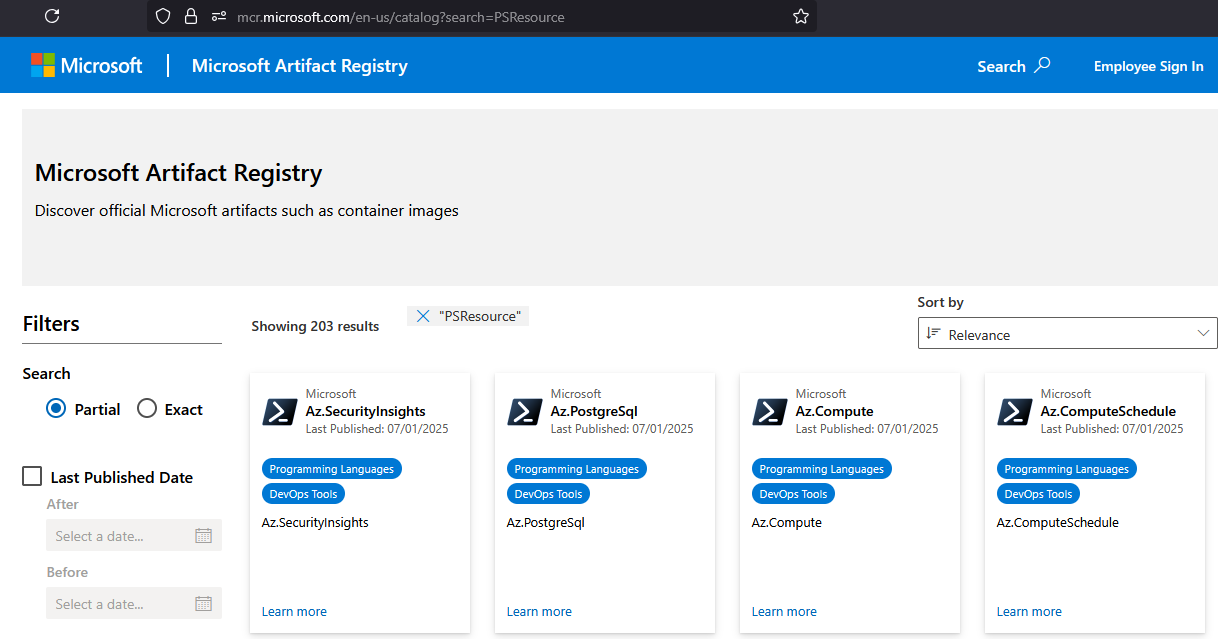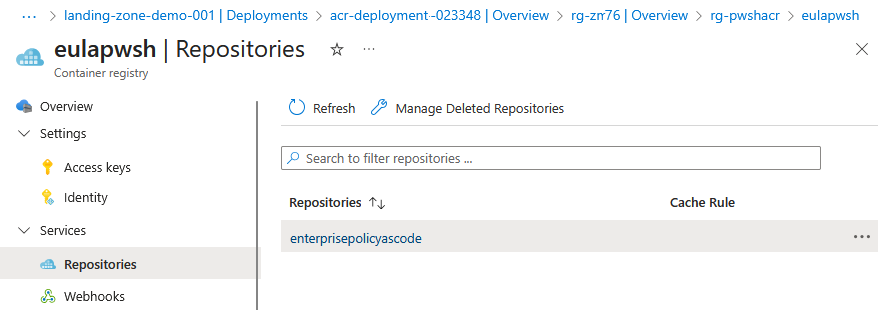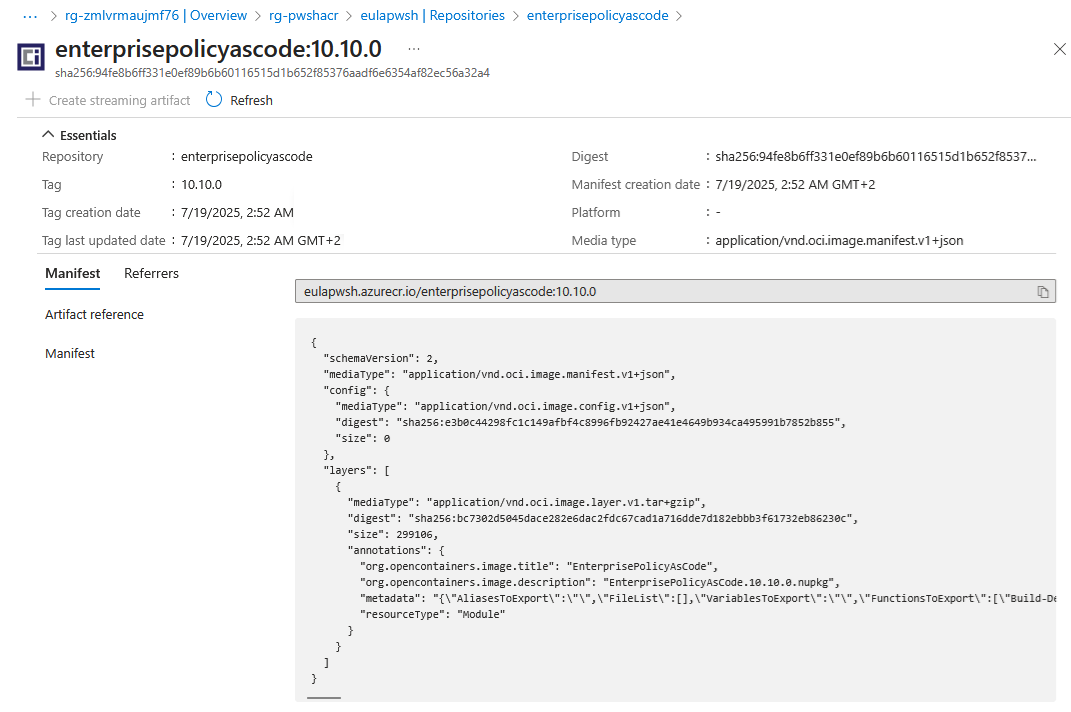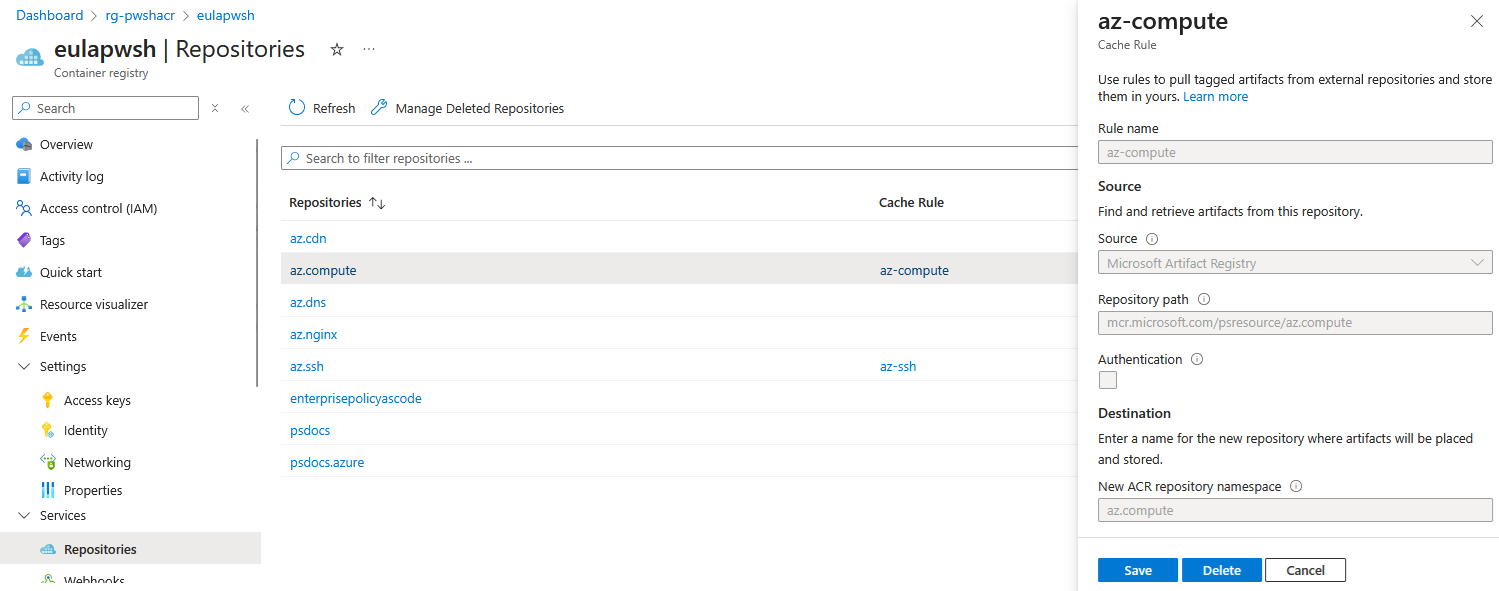
The PowerShell Gallery is full of useful modules shared by community members, but the nature of this community content makes the gallery inherently untrusted. In this post I will have a look at how you can improve your Supply Chain Security and availability by utilizing Microsoft Artifact Registry and building your own private PSGallery.
$PSGallery = -not $secure
Aqua published an article outlining some of the issues with the gallery and compared it to other package managers, you can read it in their blog. Among these issues is the risk of typosquatting in the module names, similar to GitHub Actions name. See orca security’s blog about typosquatting in GitHub Actions.
Even the default psresource repository in pwsh is marked untrusted by default.
Get-PSResourceRepository
Name Uri Trusted Priority IsAllowedByPolicy
---- --- ------- -------- -----------------
PSGallery https://www.powershellgallery.com/api/v2 False 50 True
Availability of PSGallery vs ACR
The PSGallery is not backed by any SLA and is known to experience issues.
By building our own PSGallery in an Azure Container Registry it garantees at least 99.9% availability.
Official Microsoft modules
Microsoft Artifact Registry (MAR) is the new name of the former Microsoft Container Registry (mcr.microsoft.com). It has been the place where Microsoft publishes their official container images for some time now. The name change emphasizes that it now hosts more than just container images, now PSResources is available there!

To install modules from MAR you first register the repo and then use the -Repository parameter with the *-PSResource cmdlets.
Register-PSResourceRepository -Name 'mar' -Uri 'https://mcr.microsoft.com' -Trusted:$true
Find-PSResource -Repository 'mar' -Name 'az.ssh'
Name Version Prerelease Repository Description
---- ------- ---------- ---------- -----------
Az.Ssh 0.2.3 mar Microsoft Azure PowerShell - cmdlets for connecting to Azure VMs usi…
Install-PSResource -Name 'Az.Ssh' -Repository 'mar'
Get-Module -ListAvailable -Name 'Az.Ssh'
Directory: C:\Users\eskil\Documents\PowerShell\Modules
ModuleType Version Name PSEdition ExportedCommands
---------- ------- ---- --------- ----------------
Script 0.2.3 Az.Ssh Core,Desk {Enter-AzVM, Export-AzSshConfig}
Private Azure Container Registry
The MAR is a great source for official Microsoft modules, but for non-microsoft modules we still have to rely on the PS Gallery. With PSResourceGet we have the option to host our desired modules in our own Azure Container Registry!
Once we have the ACR populated with modules we can use group policy to only allow our private ACR and block the PS Gallery.
Deploy
The bicep code required to deploy an ACR is minimal.
1module acr 'br/public:avm/res/container-registry/registry:0.9.1' = {
2 scope: resourceGroup('rg-pwshacr')
3 params: {
4 name: 'eulapwsh'
5 acrSku: 'Basic'
6 acrAdminUserEnabled: true
7 // cacheRules: []
8 }
9}
Register
When the ACR is created, it has to be registered as a repository on the machine that will use it. Registering the repository does not require any credentials. However, the first time you perform an operation on the registered repository, you are prompted to login, if you are not authenticated yet.
$splat = @{
Name = 'eulapwsh'
Uri = 'eulapwsh.azurecr.io'
Priority = 40
Trusted = $true
}
Register-PSResourceRepository @splat
Get-PSResourceRepository
Name Uri Trusted Priority IsAllowedByPolicy
---- --- ------- -------- -----------------
eulapwsh https://eulapwsh.azurecr.io/ True 40 True
PSGallery https://www.powershellgallery.com/api/v2 False 50 True
Publish
With the repository available I download a module from the PS Gallery and publish it to the ACR.
$splat = @{
Name = 'EnterprisePolicyAsCode'
Repository = 'PSGallery'
Version = '10.10.0'
TrustRepository = $true
}
Install-PSResource @splat
Connect-AzAccount
$mod = Get-Module -ListAvailable 'EnterprisePolicyAsCode'
Publish-PSResource -Repository 'eulapwsh' -Path $mod.ModuleBase



Copy to ACR
Modules stored in other OCI artifact registries can easily be copied into the private ACR.
With pwsh.
$splat = @{
RegistryName = 'eulapwsh'
ResourceGroupName = 'rg-pwshacr'
SourceRegistryUri = 'mcr.microsoft.com'
SourceImage = 'psresource/az.nginx:1.2.0'
TargetTag = 'az.nginx:1.2.0'
}
Connect-AzContainerRegistry -Name 'eulapwsh'
Import-AzContainerRegistryImage @splat
With azure cli.
az login
az acr login -n eulapwsh
az acr import `
--name eulapwsh `
--source mcr.microsoft.com/psresource/az.ssh:0.2.3 `
--image az.ssh:0.2.3
With ORAS. See FeynmanZhou blog post and the Microsoft doc to Manage OCI Artifacts with ORAS.
az login
az acr login -n eulapwsh
oras copy mcr.microsoft.com/psresource/az.dns:1.3.0 eulapwsh.azurecr.io/az.dns:1.3.0

Find and install modules
With the ACR populated and registered, it is just like any other psresource repository.
Find-PSResource -Repository eulapwsh -Name *
Name Version Prerelease Repository Description
---- ------- ---------- ---------- -----------
EnterprisePolicyAsCode 10.10.0 eulapwsh Enterprise Policy as Code PowerShell Module
Profiler 4.3.0 eulapwsh Script, ScriptBlock and module performance profiler for PowerShel…
PSDocs 0.9.0 eulapwsh Generate markdown from PowerShell.…
PSDocs.Azure 0.3.0 eulapwsh Generate markdown from Azure infrastructure as code (IaC) artifac…
Az.Dns 1.3.1 eulapwsh Microsoft Azure PowerShell - DNS service cmdlets for Azure Resourc…
Az.Nginx 1.2.0 eulapwsh Microsoft Azure PowerShell: Nginx cmdlets
Az.Ssh 0.2.3 eulapwsh Microsoft Azure PowerShell - cmdlets for connecting to Azure VMs usi…
$splat = @{
Name = 'EnterprisePolicyAsCode'
Repository = 'eulapwsh'
Version = '10.10.0'
TrustRepository = $true
}
Install-PSResource @splat
ACR Cache rules
ACR has a feature called artifact cache, this lets you cache artifacts from both public and private repositories. I have updated the bicep template with a cache rule from MAR.
module acr 'br/public:avm/res/container-registry/registry:0.9.1' = {
...
cacheRules: [
{
name: 'az-compute'
sourceRepository: 'mcr.microsoft.com/psresource/az.compute'
targetRepository: 'az.compute'
}
]
...
In the azure portal now there will be a repository named az.compute associated with the cache rule, but the repo will not have any content yet…

According to the limitations in the docs:
Cache only occurs after at least one image pull is complete on the available container image. For every new image available, a new image pull must be complete. Currently, artifact cache doesn’t automatically pull new tags of images when a new tag is available.
To populate the cache, I do a oras pull for each module version I need. This is the only way I have found to populate anything to the target repository of the cache rule, as it seems it is protected from any push operation.


Gotchas
Dependency checks
When publishing a module, there is some prechecks like checking that all dependencies are present in the target repository. Either bypass this with the -SkipDependenciesCheck parameter or publish the dependencies first.
$mod = Get-Module -ListAvailable 'PSDocs.Azure'
Publish-PSResource -Repository 'eulapwsh' -Path $mod.ModuleBase
Publish-PSResource: Dependency 'PSDocs' was not found in repository 'eulapwsh'. Make sure the dependency is published to the repository before publish this module.
Verify dependencies…
(Get-Module -ListAvailable 'PSDocs.Azure').RequiredModules
ModuleType Version PreRelease Name ExportedCommands
---------- ------- ---------- ---- ----------------
Script 0.8.0 PSDocs
…and publish again.
# publish with dependencies
$dependency = Get-Module -ListAvailable 'PSDocs'
Publish-PSResource -Repository 'eulapwsh' -Path $dependency.ModuleBase
Publish-PSResource -Repository 'eulapwsh' -Path $mod.ModuleBase
# or ignore dependencies
Publish-PSResource -Repository 'eulapwsh' -Path $mod.ModuleBase -SkipDependenciesCheck
Closing words
I really like being able to have my own PS Gallery with an SLA, as the public gallery is down sometimes.
I hope the acr team adds some automation for pulling the initial content from a cache rule and a way to handle new versions published in the upstream. For cleanup of old module versions I would like to see some kind of time-to-live for the cache, or delete tags not pulled in the last x days.
I will also revisit this to see if I can make a declerative way to express what modules and what versions should be stored in the ACR. ACR content as Code. With cleanup of old or unwanted module versions.
Big thanks to Anam Navied, Sydney Smith and Michael Green for their talks at this years PowerShell Conference EU and PowerShell Summit! Watch their presentations on youtube: